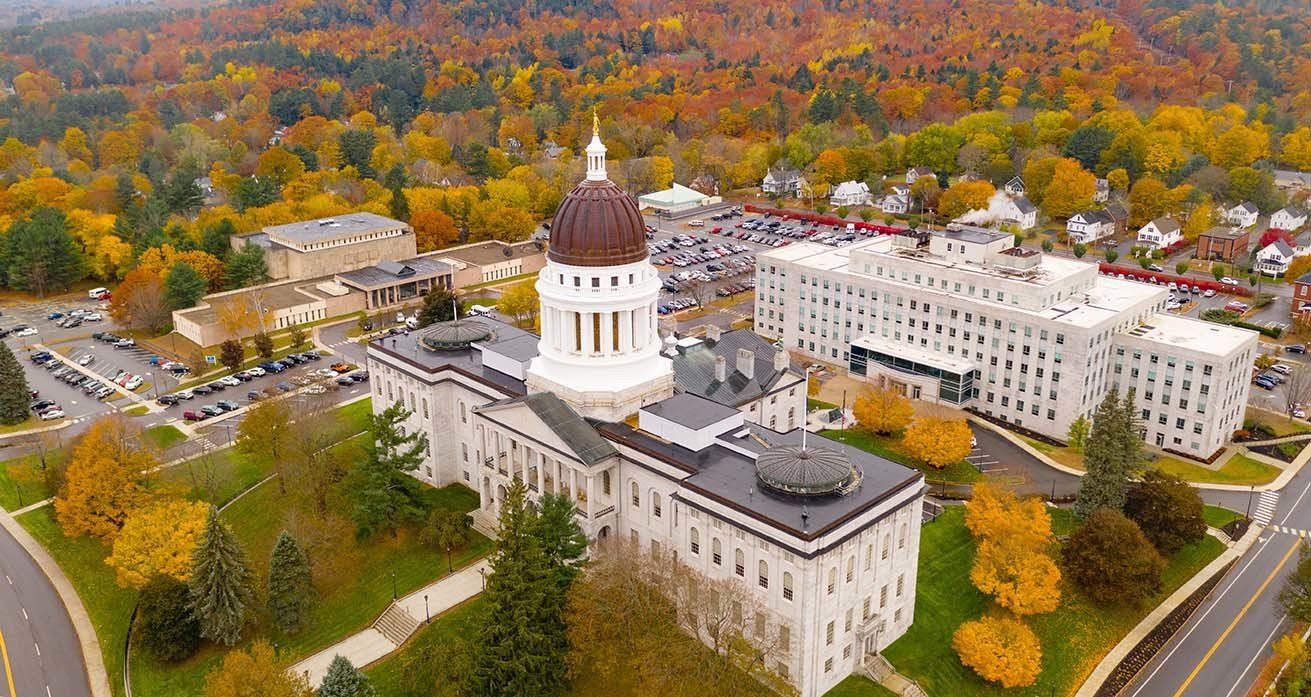2020 Maine Recreational Business Licensing Process for Marijuana Establishments
Last Updated on Jan 22, 2020
Maine Cannabis Application Process Guidance:
On a high level, All Applicants for marijuana business licenses must meet the following criteria:
- Applicants must be Maine residents if they are applying as natural persons (with the exception of testing laboratories)
- Incorporated in Maine if they are applying as a business entity with all officers, managers, general partners, and directors also being Maine residents, and a majority of shares must be owned by Maine residents.
- At least 21 years of age.
- Not be employed by a state agency with a regulatory role or as a law enforcement or corrections officer.
- Not have committed a disqualifying drug offense including state or federal criminal convictions or pending prosecutions for offenses “punishable by imprisonment for one year or more and involving the possession, distribution, manufacturing, cultivation or use of a controlled substance. The Department may grant a license to an applicant if: (a) The applicant completed his or her sentence, including any term of probation, incarceration or supervised release, 10 or more years prior to the submission of the application; or The conviction was based on conduct that is now authorized by 28-B MRS, chapter 3.”
- Not have had a prior marijuana business license or medical marijuana ID card or license revoked.
- Not owe outstanding court-ordered payments.
The Office of Marijuana Policy offers four types of licenses for marijuana establishments: stores, cultivation facilities (organized into five tiers), products manufacturing facilities, and testing facilities. For each license, the state has created a three-step application process
starting with Conditional Licensure, Local Authorization, and Active Licensure. The legislature implemented this three-stage process so that the Office of Marijuana Policy could thoroughly vet marijuana establishments before receiving approval from that establishment’s intended municipality. Once local authorization is given, which will be a significant hurdle considering that municipalities have the power to allow or ban any or all types of marijuana businesses, a marijuana establishment can obtain an active license. There are no established due dates for applications as of January 2020, but there are time frames allotted to each of the three steps with sales anticipated to begin this Spring. Since the start of Maine’s application rollout in November 2019, The Office of Marijuana Policy has received over 400 individual identification card (IIC) applications
as a part of the initial conditional licensure step. Now that all forms for each application have been made available, getting through conditional licensure quickly will be of great value, especially since the following step of local authorization approval can take up to 90 days.
Step 1: Maine Conditional Cannabis Licensure
- Applicants must schedule an appointment with IdentiGO to register for fingerprinting. Please note that if the applicant is a business entity, then every general partner, officer, manager, and director will require a criminal history records check.
- Each applicant and any employee will be required to obtain an Individual Identification Card (IIC) issued by the Office of Marijuana Policy. Please note that if the applicant is a business entity, then every general partner, officer, manager, and director will require an IIC.
- Complete and submit the conditional license application(s) and fee(s). Review the specific forms required for each marijuana establishment under the “Maine Cannabis License Types, Fees, and Qualifications” section below.
- Within 90 days, the Office of Marijuana Policy, upon determining that all application forms, required attachments, and criminal history checks are complete, will either deny or issue a non-renewable conditional license valid for one year.
This step in the application process
will require the most care, attention, and detail. Besides providing operating plans, the most significant focus of the conditional licensure step is setting up your ownership team and principals. Curating a strong team requires more time than you would think, especially since once you have recruited your team, each individual must undergo a criminal history records check and obtain an IIC. Therefore, it is a good idea to start this process as early as possible. Keep in mind that partners with business acumen related to operating and scaling a compliant business in a highly regulated market is invaluable and should be considered over cannabis-specific experience.
Step 2: Local Authorization
- After receiving a conditional license, applicants may seek local authorization. Note: Municipalities have 90 days (and an additional 90 days in some instances) to respond to a request for local authorization.
- Communities will determine if a prospective conditional license applicant has satisfied all local regulations and choose whether to grant local authorization. Upon approval, “the municipality or the Maine Land Use Planning Commission, whichever has jurisdiction over the planned site, must have submitted a signed and notarized local authorization certification form prepared and furnished by the Department.” (18-691 C.M.R. ch. 1 – Adult Use Marijuana Program, 2.6.2)
- The Office of Marijuana Policy will contact the applicant to gather updated documents and supplemental information within 10 days of receiving an approved local authorization from.
Maine Municipalities seem to be adopting a wait and see approach for opting into the state’s recreational program. As of November 2019, 18 municipalities
have chosen to allow adult-use marijuana establishments, with a few towns limiting or banning select operations. The towns of Etna and Topsham, for example, have chosen to disallow recreational retail stores. Marijuana establishments can only operate in towns that have opted into Maine’s adult-use program and will need to be diligent about navigating additional local requirements, including land use regulations and ordinances. Municipalities also have the power
to limit the number of marijuana establishments and require an additional municipal license.
Step 3: Active Licensure
- To issue an active license, the Office of Marijuana Policy will require the following supplemental information:
- Any changes to the original application.
- Updated plans on record.
- Proof of compliance with respect to Extraction (products manufacturing only)
- Facility plan
- Security plan
- Updated operating plan
- Updated cultivation plan (cultivation and nursery only)
- Excise Tax Identification Number (cultivation only)
- Sales Tax Identification Number
- Proof of registration with the State Tax Assessor
- Proof of registration with tracking system
- The Office of Marijuana Policy will invoice the applicant for the licensing fee when they are satisfied that all requirements have been met.
- The Office of Marijuana Policy will issue an active license, valid for one year, upon receiving payment.
Maine Cannabis License Types, Fees, and Qualifications:
Cultivation Facilities
- Defined as “a facility licensed under this Rule to purchase marijuana plants and seeds from other cultivation facilities; to cultivate, prepare and package adult-use marijuana; to sell adult-use marijuana to products manufacturing facilities, to marijuana stores, and to other cultivation facilities; and to sell marijuana plants and seeds to other cultivation facilities and immature marijuana plants and seedlings to marijuana stores. A cultivation facility includes a nursery cultivation facility. Licensees that cultivate marijuana in a nursery cultivation facility may sell an unlimited number of marijuana seeds and a sum total of 12 seedlings and immature plants to a consumer 21 years of age or older.
- Cultivation facilities must submit an operation and cultivation plan that includes the facility size and layout, water, electricity and waste plans, security plans, and plans for compliance that include building code and environmental laws.
- In addition to applying for an Individual Identification Card and submitting a marijuana release of information, Cultivation facility and nursery cultivation applicants must submit the following forms for conditional licensure:
- Adult Use Marijuana Establishment License Application
- Adult Use Marijuana Establishment Principal Attestation
- Adult Use Marijuana Establishment Owner Attestation
- Maine Revenue Services Principal Tax Disclosure
- Maine Revenue Services Owners Tax Disclosure
- Maine Resident Ownership for Business Entities Worksheet
- Operating Plan for Cultivation Facility
- Operating Plan for Nursery Cultivation
- Cultivation Plan
- Cultivation Facility Tiers and Fees:
- Tier 1 Plant-count-based:
- Allows the cultivation of no more than 30 mature marijuana plants and an unlimited number of immature marijuana plants and seedlings.
- Application Fee – $100
- Annual License Fee (Outdoor) – $9.00/mature plant
- Annual License Fee (Indoor/Both) – $17.00/mature plant
- Tier 1 Plant-canopy-based:
- Allows the cultivation of no more than 500 square feet of plant canopy of mature plants.
- Application Fee – $100
- Annual License Fee (Outdoor) – $250
- Annual License Fee (Plant-Canopy-Based, Indoor/Both) – $500
- Tier 2:
- Allows the cultivation of no more than 2,000 square feet of mature plant canopy.
- Application – $500
- Annual License Fee (Outdoor) – $1,500.00
- Annual License Fee (Indoor/Both) – $3,000.00
- Tier 3:
- Allows the cultivation of no more than 7,000 square feet of mature plant canopy.
- Application – $500
- Annual License Fee (Outdoor) – $5,000.00
- Annual License Fee (Indoor/Both) – $10,000.00
- Tier 4:
- Allows the cultivation of no more than 20,000 square feet of mature plant canopy, except as approved by the Department pursuant to 28-B MRS§304.
- Application – $500
- Annual License Fee (Outdoor) – $15,000.00 (+ $5,000.00 For each increase in canopy size)
- Annual License Fee (Indoor/Both) – $30,000.00 (+ $10,000.00 For each increase in canopy size)
- Nursery cultivation facility
- Allows the cultivation of no more than 1,000 square feet of plant canopy, subject to the requirements and restrictions of 28-B MRS§501(3).
- Application – $60
- Annual License Fee (Outdoor) – $350.00
- Annual License Fee (Indoor/Both) – $350.00
- Applicants are required to pay applicable application fees to the Department at the time of submission.
- An adult-use cultivation facility may also operate as a medical marijuana dispensary or as a primary caregiver, but must separate medical and adult-use cannabis cultivation areas and tag the plants as either medical or adult-use.
- A nursery cultivation facility may not sell more than a sum total of 12 seedlings or immature plants to an individual at any one time or within one day.
- Cultivation applicants may not have a direct or indirect financial interest in more than three licenses, or, in most cases, have a financial interest in facilities with a combined canopy of more than 30,000 square feet.
- Commercial marijuana cultivation facilities pay a 15% excise tax on marijuana that is sold or transferred to a retail marijuana store or a marijuana products manufacturing facility.
- Sales tax revenue will be deposited to the Adult Use Marijuana Public Health and Safety Fund.
Products Manufacturing Facility
- Defined as “a facility licensed under this Rule to purchase adult-use marijuana from a cultivation facility or another products manufacturing facility; to manufacture, label and package adult-use marijuana and adult-use marijuana products; and to sell adult-use marijuana and adult-use marijuana products to marijuana stores and to other products manufacturing facilities.”
- In addition to applying for an Individual Identification Card and submitting a marijuana release of information, Products Manufacturing Facility applicants must submit the following forms for conditional licensure:
- Adult Use Marijuana Establishment License Application
- Adult Use Marijuana Establishment Principal Attestation
- Adult Use Marijuana Establishment Owner Attestation
- Maine Revenue Services Principal Tax Disclosure
- Maine Revenue Services Owners Tax Disclosure
- Maine Resident Ownership for Business Entities Worksheet
- Manufacturing Facility Operating Plan
- Application Fee: $250.00
- License Fee: $2,500.00
- Applicants are required to pay applicable application fees to the Department at the time of submission.
- Only licensed products manufacturers extract cannabis.
- Products manufacturers must include in their plans
- “Any inherently hazardous substances to be used for extraction, along with the process for use, certification by a certified industrial hygienist or professional engineer licensed in Maine that the manufacturing facility’s storage, preparation, electrical, gas monitoring, fire suppression and exhaust systems are adequate.”
- The “status of licensure of any areas in which marijuana or marijuana concentrate is handled or combined with non-marijuana ingredients to form marijuana products as a commercial kitchen area.”
- Edible marijuana products:
- May not contain more than 10 milligrams of THC per serving
- May not contain more than 100 milligrams of THC per package
- May not be manufactured in the shape of a human, animal, or fruit
- May not be added to a trademarked product, unless that product is a component in the edible and it’s not marketed as containing it
- May not include additives that are toxic or harmful, designed to make the product more addictive, or designed to appeal to persons who are under 21
- Must have a universal symbol stamped or embossed on each serving
Marijuana Testing Facility
- Defined as “a facility licensed under this Rule to develop, research and test marijuana, marijuana products, and other substances.
- In addition to applying for an Individual Identification Card and submitting a marijuana release of information, Marijuana Testing Facility applicants must submit the following forms for conditional licensure:
- Marijuana Testing Facility License Application
- Preliminary Testing Facility Operating Plan
- Adult Use Marijuana Establishment Principal Attestation
- Maine Revenue Services Principals Tax Disclosure
- and certification:
- Initial: Application for Maine Marijuana Testing Facility Certification
- Renewal: Application for Maine Marijuana Testing Facility Certification
- Revision: Application for Maine Marijuana Testing Facility Certification
- Technology Analyte Table (download only)
- Application Fee: $250.00
- License Fee: $1,000
- Applicants are required to pay applicable application fees to the Department at the time of submission.
- Testing facilities must obtain certification from the Department of Health and Human Services, and Maine’s Center for Disease Control and Prevention.
- Testing facilities must be accredited pursuant to standard ISO/IEC 17025 of the International Organization for Standardization by a third-party accrediting body or another organization approved by regulators.
- Testing facilities must follow all regulations, including regarding recordkeeping, disposal, and testing protocol, as well as standards for the testing of different products, determining batch size, sampling, testing validity, and approval of tested products. Rules must also include acceptable testing and research practices, including related to remediation and retesting, quality control analysis, equipment certification and calibration, chemical identification, and reporting of test results.
- Those with interests in a testing facility may not have an interest in other Maine marijuana businesses, including medical marijuana, except for other laboratories.
Marijuana Stores
- Defined as “ a facility licensed under this Rule to purchase adult-use marijuana, immature marijuana plants, and seedlings from a cultivation facility, to purchase adult-use marijuana and adult-use marijuana products from a products manufacturing facility and to sell adult-use marijuana, adult-use marijuana products, immature marijuana plants and seedlings to consumers.”
- In addition to applying for an Individual Identification Card and submitting a marijuana release of information, Marijuana Store applicants must submit the following forms for conditional licensure:
- Adult Use Marijuana Establishment License Application
- Adult Use Marijuana Establishment Principal Attestation
- Adult Use Marijuana Establishment Owner Attestation
- Maine Revenue Services Principal Tax Disclosure
- Maine Revenue Services Owners Tax Disclosure
- Maine Resident Ownership for Business Entities Worksheet (this form is not necessary if you are electronically completing an application)
- Marijuana Store Operating Plan
- Application Fee: $250.00
- License Fee: $2,500.00
- Applicants are required to pay applicable application fees to the Department at the time of submission.
- Sales limitations and operational restrictions for marijuana stores are as follows:
- May not sell more than “Two and one-half ounces of marijuana; or Two and one-half ounces of marijuana and marijuana concentrate that includes no more than five grams of marijuana concentrate, whether sold alone, contained in an inhalant delivery system, or contained in edible marijuana products” to an individual at one time or in one day.
- May not sell to a person who is visibly intoxicated.
- May not operate as a medical marijuana dispensary or primary caregiver at the same location as the adult-use marijuana store.
- Medical marijuana dispensaries and primary caregivers can sell mature plants and seeds to adult-use cultivation facilities for two years after these facilities are first licensed.
- Adult-use consumers will be taxed 10% at point of sale
- Sales tax revenue will be deposited to the Adult Use Marijuana Public Health and Safety Fund.
Although there are no hard deadlines for adult-use cannabis applications in Maine, getting through the application process and becoming operational as early as possible has numerous advantages. As one of the first cultivation, manufacturing, retail, or testing facilities to operate in the state, you will be in a prime position to establish strong brand recognition and customer loyalty. Not the least of these advantages is securing compliant, and potentially limited, real estate in the municipality of your choice. To submit a successful application at every step and avoid regulatory blind spots and common compliance pitfalls, 3C has discovered how crucial it is to establish a sustainable timeline and utilize best practices and professional insights from other established industries. We have worked with nearly 500 clients across 34 U.S. states, two territories, and 17 countries. 3C has both the industry experience and business acumen required to help you submit a competitive application, no matter your operation or market.




